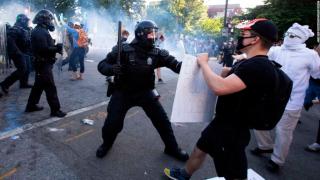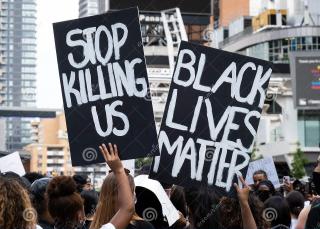Profiles Global Police Militarization U.S.
By Ashley Emuka, Noorjahan Aktar
Introduction

Police face off with civilian protestors.
Several international bodies have attempted to address global police militarization and its effect on police brutality in many nations. Amnesty International defines police brutality as “various human rights violations by police… this includes beatings, racial abuse, unlawful killings, torture, or indiscriminate use of riot control agents.” In 2001, the United Nations’ Committee on the Elimination of All Forms of Racial Discrimination (CERD) outlined police violence as “…deaths as a result of excessive use of force by law enforcement officials, which particularly affect minority groups and foreigners” and noted its concerns regarding excessive police brutality in the U.S. Through CERD, the UN has attempted to confront the U.S. on its pervasive racially discriminatory practices and unjust police homicides.
Despite strong global advocacy against militarization of the police, there is little improvement within law enforcement systems internationally. Particularly in the United States, police militarization and brutality against civilians have increasingly been societal concerns. The government has allocated military equipment, weapons, and training to domestic law enforcement, and U.S. police departments have employed tactics and weapons on civilians that are used to combat the nation’s enemies. As the world watched a jury convict former Minneapolis, MN police officer Derek Chauvin for the murder of George Floyd, Americans continued to reflect on the many injustices committed by police and to work towards accountability in the criminal justice system.
The United States is not the only place where unjust police violence reigns terror on vulnerable populations. This blog series seeks to dive into national profiles of police brutality in the United States and abroad, focusing on countries with notoriously corrupt police forces and extreme instances of extrajudicial killings among marginalized communities—including Nigeria, Brazil, China, and India. We hope to compare global incidents of police militarization and violence stemming from security forces. We will also discuss ways in which civil society organizations can commit to defunding the police, ending criminalization, and prioritizing restorative justice. As part of the EN”>Unitarian Universalist AssociationEN”>, we are committed to finding alternatives to policing and supporting actions towards police abolition.
United States
From Rodney King to Korryn Gaines and beyond, police brutality is intrinsic to the United States’ 243 year history. Since the inception of police forces as the slave patrol, the police have used weapons and racism to flagrantly harass and kill Black people and people of color in America. Beyond this origin, the police have perpetrated wrongful convictions, extreme beatings, unwarranted shootings, and corruption, despite taking an oath to protect and serve. As agents of the State, the police primarily serve White supremacy and protect property, resulting in the tragic deaths of innumerable enslaved people, Indigenous people, and other persons of color since 1619, when chattel slavery began in the British colonies in North America. (Read more in our blog post about the history of policing and racial violence.)
Mapping Police Violence, a resource created by data scientist and policy analyst Samuel Sinyangwe, gathered crucial data on over 1,100 killings by United States police forces in 2017. The research encompasses accounts of police violence from media reports, obituaries, public records, and databases, such as Fatal Encounters and the Washington Post. The report states that “1,147 people were killed by police” in 2017, with police shootings accounting for over 90% of the extrajudicial deaths. Other policing tactics, such as tasers, physical force, and police vehicles were also culpable in hundreds of police homicides. The database shows that about 150 people killed by police were unarmed at the time of their death. The research tool determined that police officers are four times more likely to kill an unarmed Black person than an unarmed white person. Given the fact that the majority of people killed by police are people of color, this figure highlights the clear racial disparities within incidents of police brutality in America.

Jonathan Mattingly, Brett Hankinson, and Myles Cosgrove, the three Louisville, KY police officers who fatally shot Breonna Taylor in her home on March 13, 2020.
Mapping Police Violence also states that “98.3% of killings by police from 2013-2020 have not resulted in officers [sic] being charged with a crime.” This injustice has sent a clear message to marginalized groups in America that not only are police officers sanctioned to commit murder, they are not being and will not be held accountable. This organization continues to report on current violence at the hands of police officers, and—Chauvin conviction notwithstanding—there has still been little to no accountability. The planning team behind Mapping Police Violence notes that it is often difficult to gather this information because such events typically go unreported. Undoubtedly, there are more incidents of police brutality than the numbers show. Nevertheless, the demands for police accountability have been increasingly thunderous, particularly last year, around the high-profile murder of 26-year-old Breonna Taylor by officers of Louisville Metro Police Department in Kentucky.
Societal awareness of unjust police treatment towards different racial groups has expanded: A 2019 Pew Research study reported that “majorities of both Black and white Americans say Black people are treated less fairly than whites in dealing with the police and by the criminal justice system as a whole.” The Black community continues to be brutalized and its members killed by police at disproportionately high rates compared to other racial and ethnic groups.

Black Lives Matter protesters pause at Dundas Square in Downtown Toronto following the deaths of Regis Korchinski-Paquet and George Floyd.
The #BlackLivesMatter (BLM) organization has had significant impact as a transnational movement and network founded in 2013 in response to the devastating acquittal of George Zimmerman for the murder of Trayvon Martin. Trayvon Martin’s murder was a major example of the complete lack of convictions, repercussions, or accountability for those in law enforcement who senselessly take the lives of Black people. Although Zimmerman was not a police officer, his defense of White supremacy and his role in vigilante policing is a function of our racist and unethical criminal justice system.
At its heart, the Black Lives Matter movement educates people about the extrajudicial violence against the Black community and provides a platform to take action. The BLM organization asserts that police violence reveals deep underlying systemic racism, initiating a profound conversation that has caused division in the country. BLM activists have since then collaborated with many organizations to push racial justice, including the Unitarian Universalist Association Office at the United Nations. Non-governmental organizations can utilize the social pressure to affect change at local levels, and they are even more powerful when working with the international community to call for systemic change in community policing and security.